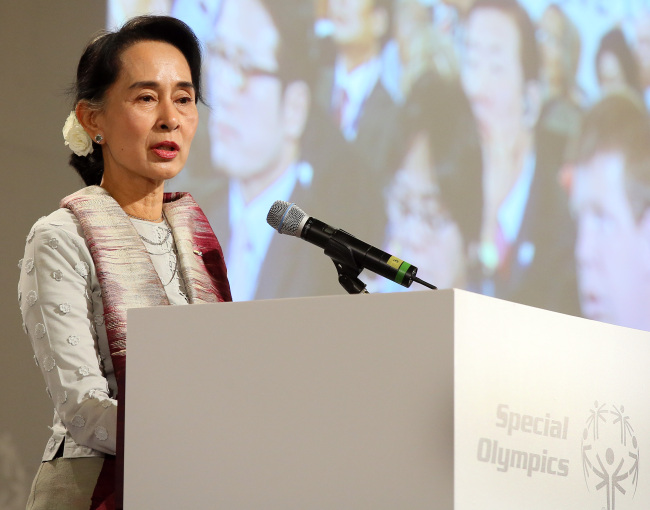PYEONGCHANG ― Burmese opposition leader Aung San Suu Kyi said Wednesday that those struggling for democracy and human rights in her country can draw inspiration and strength from the some 3,000 athletes with intellectual disabilities from all over the world competing in this year’s Special Olympics.
The thousands of athletes who gathered in PyeongChang to compete in the world winter games hail from over 120 countries, from different regions and cultures. Yet, a common story of neglect and isolation they suffered on account of what organizers described as “their special differences” could be found in inspiring life stories everywhere in PyeongChang.
Suu Kyi said she, too, found inspiration in another common story among the many athletes from Ukraine to the United States: the story of triumphing over discrimination and misunderstanding.
 |
Aung San Suu Kyi speaks during the Global Development Summit held on the sidelines of the Special Olympics in PyeongChang, Gangwon Province, Wednesday. (Yonhap News) |
“Yesterday I said to Dr. (Timothy) Shriver (CEO of Special Olympics) that we say, ‘Together we can,’ but as I watched what was going on in front of me, I felt: ‘If they can, we can, too.’ If they can overcome their disabilities, we in Burma can overcome the social and political disabilities with which we have been encumbered for the past few decades,” Suu Kyi said during a media briefing in a packed auditorium of reporters from all over the world at the first-ever Global Development Summit.
The global summit was held on the sidelines of the 10th Special Olympics World Winter Games held in PyeongChang, a winter resort in Gangwon Province about 200 kilometers east of Seoul.
Some 300 leaders from around the world at the global conference, including Malawian President Joyce Banda, called for more opportunities for people with intellectual disabilities saying it was wrong to bully, ridicule or, worse still, isolate and ignore them as was too often the case.
Participants issued a declaration at the conclusion of the global conference calling for greater protection of the rights of those who suffer from intellectual disabilities.
Suu Kyi arrived in Korea on Jan. 28 for a five-day visit, her first trip here, which includes visiting the May 18 National Cemetery in Gwangju City, where she will receive the Gwangju Prize for Human Rights that she was awarded in 2004 while she was under house arrest in Burma. Suu Kyi said that perhaps most important in uplifting the quality of life of people with intellectual disabilities was ending their cruel isolation from society.
“From my years under house arrest I understand all too well how it feels to be isolated, to be removed from society and to be parted from those one loves,” she said, adding that despite the years of detention by the military government in Burma, she felt inspired by the example shown by athletes in PyeongChang.
“At least I had a radio to link me to the outside world. I had books to read and I knew there were people rooting for me. Importantly, I had hope that one day things would change for the better,” she said. “For too many people with intellectual disabilities, they are denied even such hope.”
Suu Kyi said she felt inspired and humbled in her struggle for democracy and human rights in Burma by the empowering and inspirational athletes gathered at the Special Olympics.
“We are trying to emerge from a state of social and political disablement. So, I feel I do have a place here at this gathering, a small place but one that I regard with great respect and with great pride,” Suu Kyi said.
“After all what we are fighting for in Burma is also disablement, social and political disablement,” she said.
By Philip Iglauer (
ephilip2011@heraldcorp.com)








